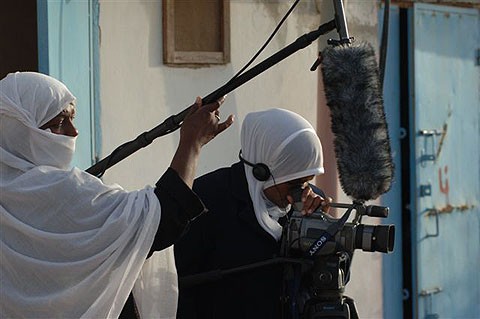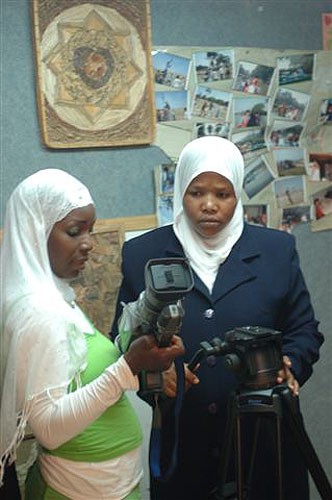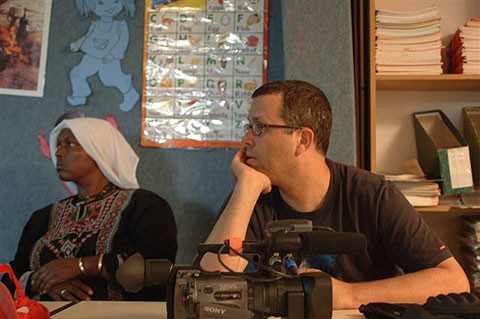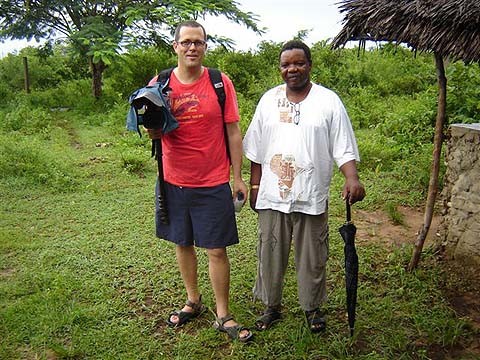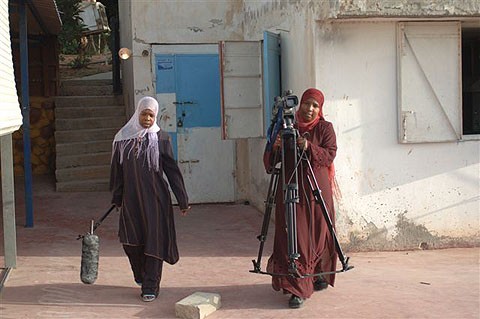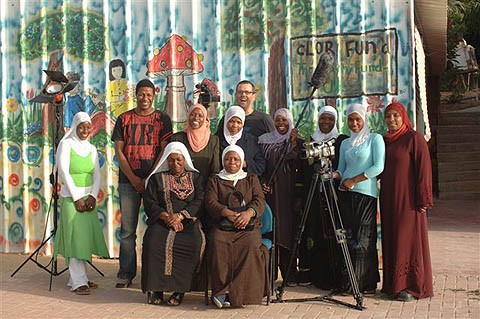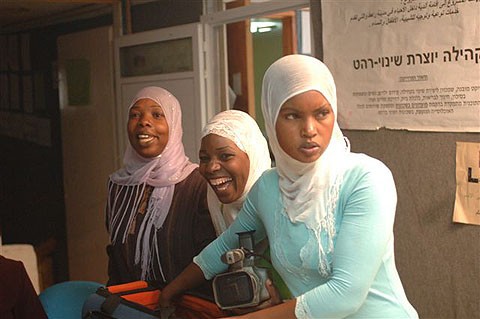About two years ago, Filmmaker Uri Rosenwaks, came to Rahat, a Bedouin town down in Israel's Negev Dessert, to teach a group of Black Bedouin women a class in filmmaking. Rahat is by no means an ordinary place. It is afflicted with pessimism, unemployment, poverty and violence. It is partially populated by the Black Bedouins who were brought to the Negev, and the Middle East at large, as slaves. Kidnapped in Africa by Arab slave traders, they were auctioned-off in Saudi Arabia, Egypt and Zanzibar. Until 50 years ago, the Black Bedouins were enslaved by the White ones. When the Director first started working with the group, he had no knowledge of it. The women never mentioned the issue he found increasingly intriguing. Only after about 18 months of working and making short films together, did he work up the nerve to suggest that they will make a film telling the history of the Black Bedouins. Suddenly, a small and modest course in filmmaking became a place in which a great taboo comes into the open. The women still suffering discrimination to this day unveil a story which few have spoken of.
Synopsis
About two years ago, Filmmaker Uri Rosenwaks, came to Rahat, a Bedouin town down in Israel's Negev Dessert, to teach a group of Black Bedouin women a class in filmmaking. Rahat is by no means an ordinary place. It is afflicted with pessimism, unemployment, poverty and violence. It is partially populated by the Black Bedouins who were brought to the Negev, and the Middle East at large, as slaves. Kidnapped in Africa by Arab slave traders, they were auctioned-off in Saudi Arabia, Egypt and Zanzibar. Until 50 years ago, the Black Bedouins were enslaved by the White ones. When the Director first started working with the group, he had no knowledge of...
Awards
- The Art of Cinema Award – The Israeli Science, Culture and Sports Ministry, 2007
- Special Commendation Mention by SIGNIS – Zanzibar International Film Festival, Africa, 2007
- Special Mention by UNESCO Jury Breaking the Chains – Zanzibar International Film Festival, 2007
Festivals
- Cape Town Israeli Documentary Film Festival, South Africa, 2009
- Maine Jewish Film Festival, USA, 2008
- Philadelphia Jewish Film Festival, USA, 2009
- San Francisco Jewish Film Festival, USA, 2008
Press & Links:
This fascinating film is about the terrible discrimination against blacks by the Bedouin of the Negev, which is unveiled in the framework of a modest class in filmmaking.
Documentary filmmaker Uri Rosenwaks is hired by the NGO, Step Forward, to teach film to a group of black Muslim women in Rahat. He teaches these women how to hold the camera (the woman in the picture is holding a sound boom), how to interview, and eventually, how to deal with sensitive issues. He learns that the black community lives separately, as a distinct minority and he tries to get the women to talk about it in the course. He also tries to get them to talk about their roots about which they know almost nothing. As a result of his prodding, the women interview one of the elders of their community and discover that their ancestors were bought as slaves by Arab Bedouin, that their roots are in Ethiopia and Sudan and that their ancestors were branded like cattle.
for the entire review by Amy Kronish, check:http://israelfilm.blogspot.com/"On the other side of the African continent, at Stone Town on the island of Zanzibar off Tanzania, Israeli filmmaker Uri Rosenwaks led his filmmaking class – five “Black Bedouin” women from the town of Rahat in the Negev Desert – on a similar pilgrimage in 2005. In southern Israel’s Negev Desert, the Rahat Black Bedouins descend from Africans kidnapped by Arab slavers during the same period but taken east.
The mirroring that occurs within each film and between the two films is frequent. In a stroke of cinematic good fortune, Katrina Browne herself carries the same DeWolfe profile that echoes in every family portrait her film puts on-screen, making somberly visible the legacy she experiences so sharply. The DeWolfe family’s return to Ghana coincided with a massive gathering that aimed to ritually cleanse the area of its slaving past; during one moment when Browne watches a procession of hereditary tribal leaders, she wonders if her ancestors and theirs “did business.” That family business was the largest single slaving enterprise in US history, an elaborate “triangle trade route” involving almost 50 ships, their own bank and distilleries, the Ghanaian and Cuban sites, a Charleston slave auction house and connections in 40 other US cities.
On both African coasts, the holding dungeons that remain are bleak gray stone affairs, squat, dank, thick-walled and half-underground, made for holding hundreds of naked human beings in almost unbelievably tight, dark spaces. And in each place – despite the distance traveled, which has required considerable commitment and overcoming – the visitors must will themselves over the threshold."
For the entire review, look for Nancy Keefe Rhodes's review at criticalwomen.blogspot.comKeeping it Reel
"With a wide range of gripping stories and insights, Israeli documentary films are thriving...The focus of Israeli documentary can vary widely..yet they have a common denominator: they unflinchingly examine the realities of Israeli society, whether in a political, religious or social realm. .. Uri Rosenwaks,who directed a movie about Black Bedouins and Yael Klopmann whose
film expands on the recent evacuation from Gaza represent a small piece of a rich and growing field.
"In THE FILM CLASS, it is the subjects of the documentary - Black Bedouin women - who are crossing boundaries. Directed by forty-something Rosenwaks, a veteran filmmaker, it relates the experiences of a group of Black Bedouin women in the Negev town of Rahat to whome he gave a course in filmmaking. In 2007, it won Best One Hour Documentary at the Annual Documentary Awards in Israel. More recently, it was given the special UNESCO mneniton at the Zanzibar International Film Festival.
Rosenwak's students do the filming...The truth they uncover - that their ancestors were brought to Palestine from East Africa as slaves by Arab traders during the 19th and 20th centuries and that their community has since endured severe discrimination at the hands of the white Bedouin population - is dramatic and unsettling. It seems that the prejudice had been taken for granted that the women are almost unaware of an alternate reality. Rosenwaks' story is really about education as empowerment."Sara K. Eisen/Hadassah Magazine, March, 2008
Director Uri Rosenwaks discusses the genesis of the project documented in his film, as well as the cultural challenges faced by Bedouins living in Israel:
for the interview click here
"This compelling documentary follows filmmaker Uri Rosenwaks as he engages in a unique social experiment: teaching filmmaking to a group of black Bedouin women in the Israeli city of Rahat. The women are descendants of Africans brought to the Holy Land by Arab slave traders, yet in today's modern Israel, they are still subject to racist treatment by the white Bedouins who enslaved them up until 50 years ago. The women use their newfound filmmaking skills to address the erasure of their history from Bedouin tradition, as well as the taboo against interracial marriage (they even travel to England to interview a black Bedouin man who was forced to flee when he dared to marry a white woman). The Film Class offers a fascinating look at a barely-acknowledged aspect of Israeli society while quietly questioning basic hypocrisies within a highly subjective interpretation of Koranic laws.If the film has a flaw, it's that the 53-minute running time doesn't really allow us to get to know the women in-depth (and we never see their reaction to the finished film). Nonetheless, this is a provocative celebration of empowerment through digital cinema, and is recommended for both Israeli and Islamic studies."
Video Librarian, January, 2008
"The Film Class” is a provocative celebration of empowerment through digital
cinema and is recommended for anyone interested in both Israeli and Islamic
studies." For the entire review by Phil Hall, check:
www.filmthreat.com/index.php?section=reviews&Id=10368
“The Film Class” opens up one of the greatest and most enduring tragedies in human history, one that is, incredibly, hardly known in the West at all: the slave trade of the Muslim and Arab world.”
For the entire article by David Channof, check: http://www.forward.com/articles/12119
"Israel," says Rosenwaks, "is turning into a capitalistic jungle," and it's leaving behind some of its struggling citizens. With no previous knowledge of the status of black Bedouin, Rosenwaks took what he absorbed in 18 months and turned it into a 53-minute documentary called "The Film Class," completed in 2006 and now weaving its way through the Jewish film-festival circuit.
For the entire article by Karin M. Smilk/Jewish Exponent, check:
http://www.jewishexponent.com/article/13325/
“Centuries after they were brought to Palestine as slaves, a film shows how black Bedouin still face discrimination”.
For the entire article by Khadija Bradlow, Sunday Times, February 25, 2007, click here.
“The audience at Esra’s latest offering of its Cinema Club on Tuesday December 26 braves the stormy weather to view a most interesting film called “The Film Class”, and was warmly treated to its fascinating content”. For the entire article by Sara Goundland, please click here
“It wasn't until about a year and eight months had passed that Rosenwaks was able to advance from helping the group create a few conventional documentaries, to making one that really involved the participants in core issues.”
For the entire article by Stephen Kramer, click here.
The Film Class was shown at Rahat, the biggest Bedouin City in Israel. Herewith a review in Arabic, following the Screening.
"The film itself is short, just under an hour, perhaps designed to fit into a standard television time slot. I would have liked it longer, because there's so much more to Film Class than just a film class. As some of the reviews explain in more detail, this is really a story of self-discovery by women who finally confront an issue they had avoided their entire lives: how did black people come to be living in the Negev to begin with, and what does that origin have to do with their low status today? With Bedouin at the bottom of the Israeli status ladder and black Bedouin on the very bottom rung, black Bedouin women are as far down as it's possible to get. They have a disarming sense of humor, though, amidst the heartache."
"Positive note: Uri Rosenwaks writes that the Step Forward Foundation that backed his film has received new funding to buy professional television equipment, which 20 Rahat women are now learning to use. The goal is a Rahat community television station. Now that could be interesting."
Dennis Fox's Blog, January, 2007
link 1
link 2
Israeli film maker helps put Bedouin woman behind the camera, for the item click here
James Murray-White, Israel 21c, November, 2006
"A community nearly always overlooked in discussions of race and ethnicity in
Israel, black Beduin, viewers learn, are believed to have arrived in the
Middle East as slaves from east Africa, where they were captured and sold by
Arab merchants until as recently as a century ago."
For the Article by Nathan Burstein, The Jerusalem Post, click here
Manuela Dviri, Vanity Fair review on "The Film Class", October 2006
(in ITALIAN) for the article click hereFrom the press:
"A fascinating story"
London and Kirshenbaum, Channel 10
"An exciting movie"
Nahum Mohiach, Israeli
"The Film Class taught them how to film and much more than that… It taught them who they were"
Dvorit Sargal, Rating
"They went out searching, and came back with answers that stirred up their world"
Ma'ariv Weekend Issue
"The 11 wondrous women from Rahat will catch you at first sight"
Manuela Dviri, Vanity Fair
"The 11 wondrous women from Rahat will catch you at first sight"
Manuela Dviri, Vanity FairFestivals
- Cape Town Israeli Documentary Film Festival, South Africa, 2009
- Maine Jewish Film Festival, USA, 2008
- Philadelphia Jewish Film Festival, USA, 2009
- San Francisco Jewish Film Festival, USA, 2008
- Israeli Showcase, Vienna Film Archive, Austria, 2008
- Film Is Real Festival, The Netherlands, 2008
- 16th Annual Pan African Film Festival, L.A., USA, 2008
- Conference about Anti-Slavery – Arizona State University, USA, 2007
- Boston Jewish Film Festival, USA, 2007
- Cucalorus International Film Festival, USA, 2007
- MESA Conference, 2007
- Hot Springs International Film Festival, USA, 2007
- PSBT Open Frame International Film Festival, India, 2007
- The Other Israel Film Festival, NY, USA, 2007
- International Documentary Film Festival CRONOGRAF, Chisinau, Moldova, 2007
- Zanzibar International Film Festival, Africa, 2007
- Prix Visionica Int'l TV Festival, Poland, 2007
- Toronto Jewish Film Festival, Canada, 2007
- Israel Film Festival in Brussels, Belgium, 2007
- The Hungarian Film Archive, Budapest, 2007
- Maryland University – Middle Eastern Studies Conference, USA, 2007
- Palm Beach Int'l Film Festival, USA, 2007
- Penn University, USA, 2007
- Columbia University, USA, 2007
- Nazareth International Human Rights Film Festival, Israel, 2006
- Vienna Jewish Film Week, Austria, 2006
- The Wolgin Award Competition – The Jerusalem International Film Festival, 2006
Educational
- Norton Museum of Art, Palm Beach, USA
- University of New Hampshire
- Stanford University
- Seminar Ha'kibutzim, Israel
- Portland State University
- University of Wisconsin
- UCLA
- University of Florida
- Ezra Film Club, Israel
- BJE Jewish Community Library
- Ohio State University
- University of Notre Dame
- Ben-Gurion University
- Syracuse University – Conference about Slavery, USA, 2008
- Bar-Ilan University
- Conference about Anti-Slavery – Arizona State University, USA, 2007
- MESA Conference, 2007
- Cornell University, USA
- UC Berkeley, USA
- Duke University
- Harvard University
- Yale University
- University of Austin, Texas
- Penn University
- Boston College
- Tel Aviv University
Awards
- The Art of Cinema Award – The Israeli Science, Culture and Sports Ministry, 2007
- Special Commendation Mention by SIGNIS – Zanzibar International Film Festival, Africa, 2007
- Special Mention by UNESCO Jury Breaking the Chains – Zanzibar International Film Festival, 2007
- Best One Hour Documentary Award – The Israeli Annual Documentary Awards, 2007
